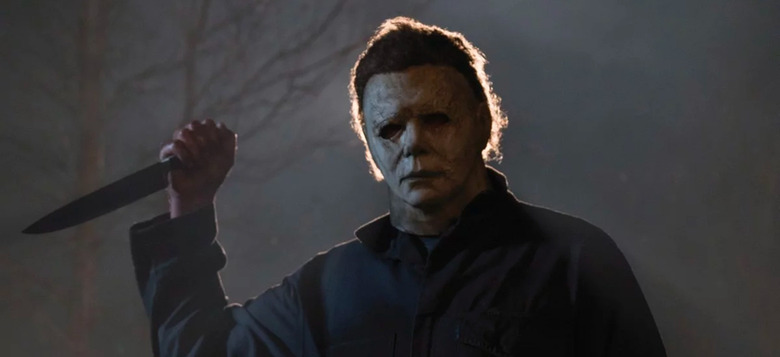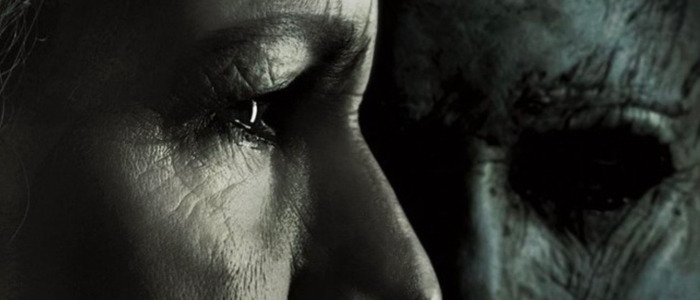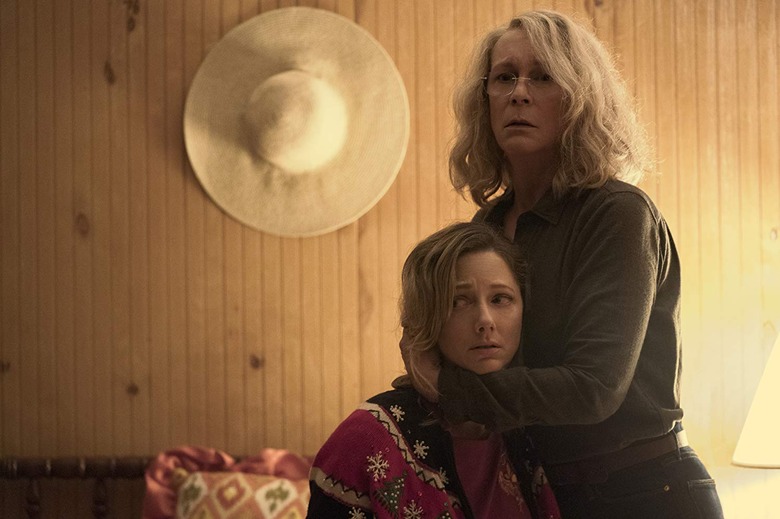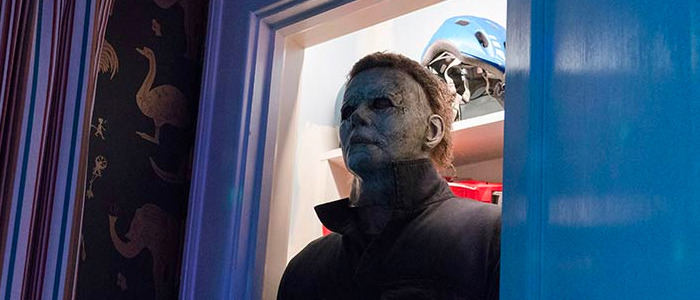How The New 'Halloween' Reinvents The Slasher Movie For The 21st Century
"Adaptation." In movies, humanity – whatever the medium – adaptation is integral to sustained longevity. Slasher films once ruled horror wavelengths from a gore-slathered throne, but have since become fossilized designs of the past. In today's social climate, there exists less movie-watching appetites hungry for sleazy womanizing, death for death's sake exploitation, T&A filmmaking (though not that all slice-'em-ups followed this formula). Slashers eventually died out when subgenre popularity shifted from the freewheeling '80s into current "heightened" arthouse visions or Blumhouse/Wan-iverse strangleholds. The year is 2018 and horrors of our everyday life are darker than anything Hollywood can dream up (re: this year's obsession with familial horror), but we're due for a slasher renaissance and there's one new release release primed to surge a new wave of slasher content.
David Gordon Green's Halloween has the power to rebirth a fresh onslaught of retooled slasher films for the contemporary, conscious, bigger-thinking worldview climate of post-2010 realities. Here's why.
If you think slasher cinema has vanished altogether, a relic subgenre not attempted since both Freddy and Jason failed to reboot, oh how wrong you are. Indie-underground resistances strive to keep "party-hard" slasher content alive, but there's a reason you don't know them. Most titles understand nothing about adaptation and are simply clinging to the trademarks of Murder Sleepaway 27 or Boobs And Blood XXXII. Abandon story, jettison character development, and "give the people what they want." You know, because these films are breaking box-office records.
Not all are disparaging duds. The best efforts are rooted in the most mythology or practical homage. Adam Green's Hatchet franchise never got the mainstream love it deserved, and Chromeskull's reign deserved a more fighting chance. But if you sink deeper into the misinformed murkiness of "slasher normalcy", you'll dust off leery perv-outs like Muck with their misogynistic representation of "horror babes." Clowntown's unnecessary opening on a naked woman who dies with no penalty to the plot. Pitchfork and that "hilarious", AKA out-of-touch, barnyard square dance...
Never mind, we could be here all day listing examples (and I might need to reassess my horror watching habits). All this to say yes, slasher films are still produced on a monthly, even weekly basis depending on the season. Most with the worst intentions linked to horror filmmaking staples that died out with evolving audience tastes.
What's the definition of insanity? Doing the same thing over and over but expecting different results? No matter how you rate Halloween (2018), Green – along with co-writers Danny McBride and Jeff Fradley – pens a script that fights back against the above nearsighted misunderstandings. Intended or not.
“The World is Not a Dark and Evil Place!”
As good horror does, Halloween becomes a reflection of humankind. Michael Myers is not removed from our daily circumstances. Instead, John Carpenter and Debra Hill's looming "shape" who preys on the innocent is used to expose cultural horrors stalking our modern world. Stoner savant Dave (played by Miles Robbins) puts Haddonfield's devil into "perspective" when suggesting, "A couple of people getting killed with a knife isn't that big a deal by today's standards." Granted, the trauma inflicted and passed down through the women of Strode bloodlines – Laurie (Jamie Lee Curtis), her daughter Karen (Judy Greer), and granddaughter Allyson (Andi Matichak) – is very real in the microcosm of a rural Illinois town. That said, Michael Myers' presence is used to hit upon the anxious state Americans find themselves experiencing on a daily basis. Paranoia channeled through a slasher filter and projected farther than Myers' reach could ever swipe.
Such represents the most significant divide between Laurie and Karen. One a survivor, two-times divorcee, and "unfit mother" as deemed by child services. The other? Karen takes all the pain and abandonment felt when her "unstable" parent loses custody and becomes an ignorant voice of the masses who preaches rainbows and unicorns. "The world is not a dark and evil place!" This coming from the woman so unfurled she wears a Christmas cardigan on October 31st to embrace cheer and joy. "If I don't acknowledge it, it can't hurt me." Wishful thinking, but Laurie's "cruel" preparedness is the only thing that keeps Karen alive because what lurks in the shadows must be respected.
Karen and husband Ray (Toby Huss) represent the All-American family in this case, unphased by talk of boogeymen in their neighborhood suburb because nothing bad can ever happen here! In our backyard! These are the same ignorant feelings that continue to lead a moral decline as many turn a blind eye to fact and circumstance. Laurie is treated like an insane person for living through Haddonfield's "Babysitter Murders" much like female assault victims who come forth are told they're simply leading a "witch hunt" by leaders with microphone amplification. Ray, having been informed of Michael's ongoing slaughter, stands inside Laurie's basement panic shelter playing with a yo-yo because he's still brainwashed by thoughts of "safety" that softened his guard thus far. Did you laugh at Ray's pendulum yo-yo trick? Right. I consider that some of the film's scariest material.
Is Halloween on par with They Live or Get Out? Masterclasses in public commentary and human instability? As right-leaning influences and shifting political landscapes sculpted some of the best slasher films to come from '70s and '80s volatility, so influences a very uncertain time in this era's stateside history. Green is unafraid to assure Michael Myers isn't the only thing you should fear in Halloween. Michael Myers is a vessel. Laurie's sacrifice when it comes to Karen is one that today's parents face when preparing children for a life met with sharpened fangs. "She hates me, but she prepared for the horrors of this world." More than anything, Green escapes Haddonfield without physically leaving town borders to maximize dread that might/should be inherent in every single one of us.
Even further, what about the film's award-winning true crime podcasters – apologies, "investigative journalists" – who hope to humanize a beast around his 40th murder anniversary so commuters have a few more hours of content worth listening to?
It's been alluded to that British 'casters Aaron Korey (Jefferson Hall) and Dana Haines (Rhian Rees) aren't very good at their jobs, which I agree with. That's what highlights the "thirst" of their endeavor. Reflecting an "unbiased" lens on Michael Myers, trying to bribe Laurie into the same room as Michael, attempting to exploit extreme tragedy for entertainment minutes. It's that grey purgatory between true crime podcasts examining data from a stance of investigative readdressing versus unearthing tragedies without purpose beyond advertising dollars. Aaron and Dana, to me, align with the latter to expose capitalization on media trends no matter the cost. Provoking Michael Myers with his signature mask, awakening a demon that, once again, is vastly underestimated.
Challenging the Norms
Halloween isn't against teenage canoodling or school dance hanky-panky. Victoria (Virginia Gardner) fully intends to honor her boyfriend Dave's date-saving "10-31-18" tattoo before Michael shows up. That said, once again the film's social consciousness rears its head in subtle but renewed ways. In something akin to the previously mentioned Muck, "slutty" female stereotypes are discarded after seducing a male character. Halloween alternatively plays into today's conversations around consent and equality in representation. Dudebros had their fun. Now it's time for more inclusive and responsible storytelling while still skewering heads on spiked iron gateway bars.
Take Oscar (Drew Scheid) and his unfortunate shortcut. At first, Cameron's (Dylan Arnold) alcohol-influenced smooch with another classmate seems like a slight breakup arc Allyson's littlest Strode doesn't need to endure (cheap high school drama). Then Oscar swoops in as the horned (horny) "bestie" who suggests they cut through backyards on the way home, and Cameron's breakup kiss becomes clearer. Oscar, laying compliments on Allyson thick and heavy, gets her alone then leans in for some action. Allyson immediately pulls back, shaming the boy for assuming his "nice guy" routine towards someone who expresses zero interest equals a free horndog pass. In a lesser story, Oscar might have pressed further and become more forceful. In Halloween, he wallows there and reflects on Allyson's shaming before Michael adds another body to his count.
"You ever really like a girl and couldn't have her," he mutters to a shadowy figure from afar. A lesson learned the hard way.
Children also play a notable part in this emboldened representation, bet it Julian's (Jibrail Nantambu) cries for chivalry when screaming "Send Dave first!" or actor Vince Mattis' protest against hunting. The latter more out of nowhere, as a son explains how he'd rather be at dance class than scoping animals with dad because "dancing is my thing" and he's exploring himself. It's such an offhanded conversation, but charmingly individualistic. And Julian? He's the best part of Halloween as the wisest Haddonfield inhabitant. One boy dies because he's forced into a macho activity despite conflicting desires, another begs Dave to man-up in the most scene-stealing way before he books it. Usually, we'd witness the reverse.
Three Generations of Survivor
As Laurie, Karen, and Allyson huddle atop Laurie's basement trap's staircase, glaring down at a broiling Michael Myers, three generations of Strode finally see justice brought to the man who stole their lives. This isn't just a fulfilling reconciliation of the Laurie Strode character arc. Michael's crispy-fried "demise" (let's be real, he's not visible in final inferno cinematography) sees three women glaring into the eyes of an evil that so many claimed to be no longer a threat. Years and years of Laurie being pushed towards therapy and shunned and chastised. No one believed ghost stories, but more importantly, no one believed her.
There's more to Strode's (momentary) vindication than fan-servicing a showdown between embattled Laurie and aged-but-still-invincible Michael Myers. More behind all three female Strodes stabbing, shooting, and capturing Michael. Importance in Karen fawning her inability to plant a bullet in Michael Myers ("Gotcha"). Justification to all the men of Halloween failing the women around them (and dying). Halloween contorts horror's "final girl" definition to read with guards still raised for an entire gender as Allyson is seen clutching her bloody kitchen knife defense weapon in Green's final shot. It's an encapsulation of feelings shared by those who understand that winning one battle does not vanquish an entire scourge, which would have been a tremendous message to be landed by a female director. Green succeeds, but imagine a different set of chromosomes directing tone.
Laurie Strode's desire to kill Michael Myers could spawn from so many reasons. Survivor's guilt. Mental breakdown. Doomsday paranoia. But most of all? I read Laurie's desire to stake Michael in the heart as an assurance that someone will. Aaron and Dana want to monetize him. Dr. Sartain (Haluk Bilginer) wishes to "study" Michael. Others fail to respect the Myers legend. Laurie becomes a hollow shell of herself because no one will listen and she's left to face the unspeakable herself. Curtis' isolated fortress and trembling hand a product of society's treatment over the years. These seem like horror movie tropes in moments of monster vs. man standoffs, but under a social context, hit upon a very "now" sense of fear bordering the existential and unbelieved. Everyone challenges Laurie about how bad things can get and they receive an answer no one is prepared for.
Embrace and Learn From Fear, Don’t Hide From It
Horror cinema doesn't have a necessary responsibility to preach or incite riots or even want to extrapolate on horrors of today. Movies can be an escape and that's fine. But when scary stories can become scary relevant, or refocus uncertain anxieties some might ignore out of blissful disregard, you get a movie like Halloween. An exemplification of how dead and buried formats from our past – slasher cinema, in this case – can be reanimated with truth serums slurped from the vein of current paranoias. What once worked doesn't have to again. Adapt, evolve, and tap into themes that resonate with today's moviegoer. This is how Halloween rejuvenates Michael Myers, an icon reincarnated on the forefront of concerns experienced by everyday people in a time where "Five Dead By Stabbing" would barely register on cable news stations.




